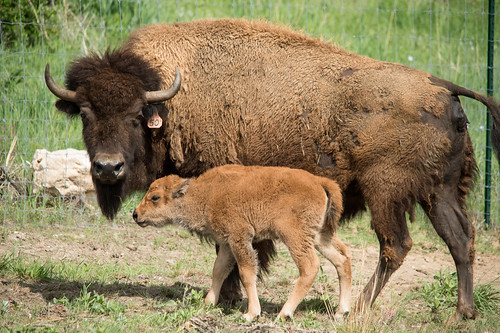
New greeters welcome visitors to the USDA-APHIS National Wildlife Research Center (NWRC) in Fort Collins, Colorado. They are big, hairy, and far from shy.
Twelve bison are housed on Colorado State University (CSU) land adjacent to NWRC’s front gate. These bison are part of a collaborative reproductive study among APHIS-Veterinary Services (VS), CSU, the City of Fort Collins, and Larimer County, Colorado.
Co-located at the NWRC are VS experts Dr. Jack Rhyan and Matt McCollum. Both have a long history of working with bison in the Greater Yellowstone Area. Now, they’ve teamed-up with colleagues at CSU’s Animal Reproduction and Biotechnology Laboratory to establish genetically-pure and disease-free bison herds for conservation purposes.
“Many people may know about APHIS’ work related to brucellosis and bison in the Greater Yellowstone Area,” states Dr. Jack Rhyan, a wildlife pathologist and veterinarian with APHIS. “This project allows us to take what we’ve learned about the disease and apply new reproductive techniques to create disease-free animals. The goal is to establish new herds of bison that contain valuable Yellowstone genetics without spreading brucellosis.”
CSU experts have developed a process that allows genetic material from Yellowstone National Park bison to be cleansed of brucellosis— a contagious and costly bacterial disease— and used to create embryos that are then transferred into surrogate bison in Fort Collins. The results are genetic descendants of Yellowstone bison that are free of brucellosis.
The bison at NWRC’s front gate will be released into a 1,000-acre fenced pasture at Soapstone Prairie Natural Area and Red Mountain Open Space in northern Colorado on November 1st - National Bison Day. The public is welcome to participate in the celebration. For more information about the release of the Laramie Foothills Bison Conservation Herd, please visit the Fort Collins website.
